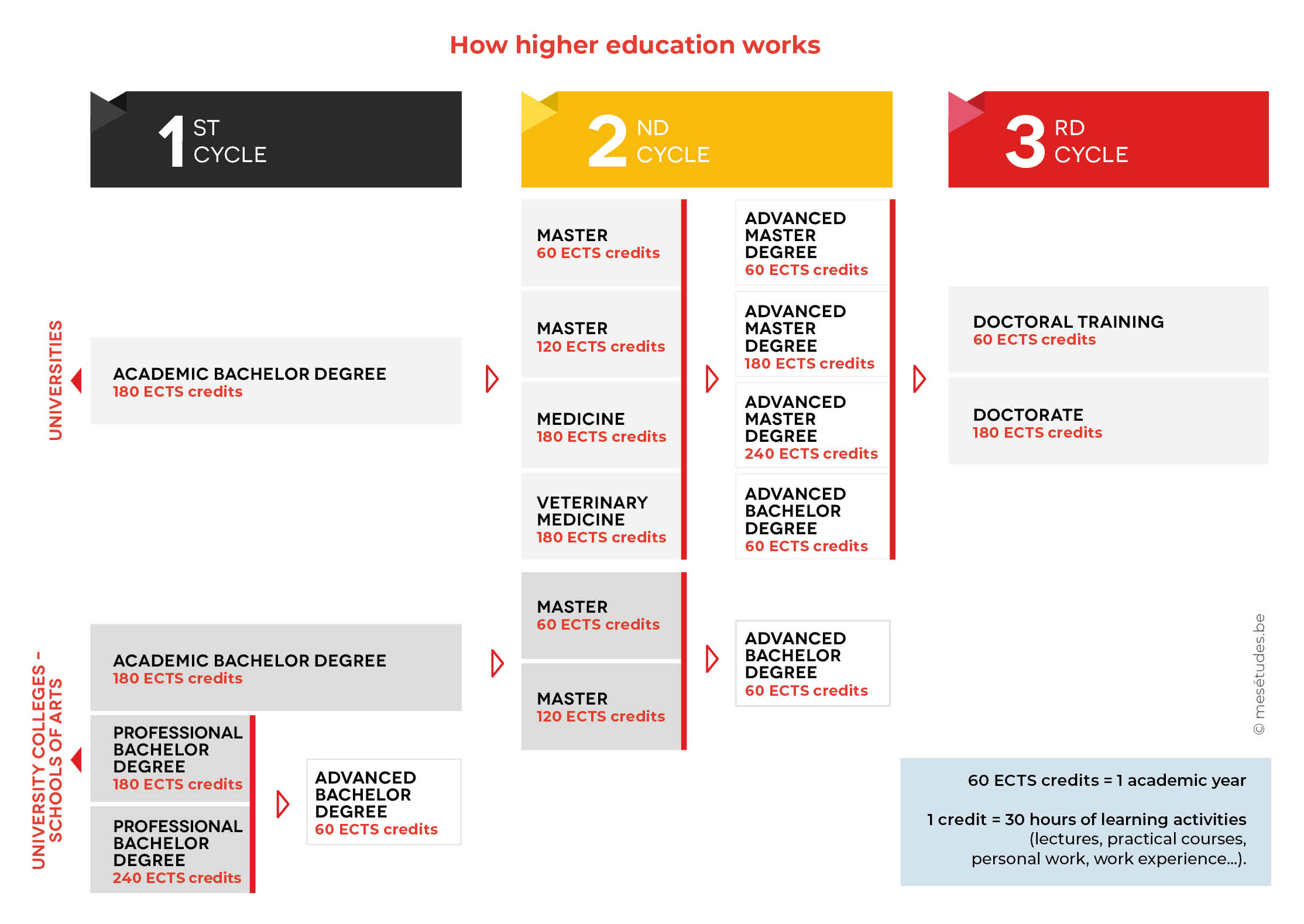Equivalence: Belgian qualifications acknowledged worldwide thanks to ECTS credits
In French-speaking Belgium, higher education is based on a system of three cycles of studies: the Bachelor’s degree, the Master’s degree and the PhD. Each qualification obtained gives you ECTS credits, which are recognised in numerous countries in both the European Union and worldwide. As an adhering member of this system, the Wallonia-Brussels Federation is committed to guaranteeing the quality of higher education, promoting student mobility and strengthening the globalisation of its higher education.

What exactly is the CCES system and what are ECTS credits?
The organisation into three cycles (Bachelor’s degree, Master’s degree and PhD) or CCES (higher education qualification framework) shared by most of the European Union countries, makes recognition of qualifications between the various countries far more simple. Just as it does student mobility within Europe and beyond.
Thus the award of the qualifications is linked to the number of years of studies completed since entering higher education. Each year can award up to 60 ECTS credits (European Credits Transfer System), which can be used and transferred from one country to another.
Studying in the Wallonia-Brussels Federation will give you the chance to continue your studies elsewhere in Europe where your qualification will be immediately recognised and, in the end, you can accordingly gain access to the whole of the European employment market.
How do ECTS credits work?
As a general rule, 60 ECTS credits represent a complete year of studies or work. During a standard year spent in higher education, credits are broken down into different learning activities. Such as, for example, lectures, practical courses, internships, etc. Depending on your study cycle, you will earn a greater or small number of ECTS credits:
- A 1st cycle qualification (Bachelor’s degree) represents 180 or 240 ECTS credits, namely 3 to 4 years of study.
- A 2nd cycle qualification (Master’s degree) represents 60 or 180 ECTS credits, namely 1 to 3 years of study.
- A 3rd cycle qualification (PhD) represents a variable number of ECTS.
60 ECTS credits = 1 academic year
1 credit = 30 hours of learning activities (lectures, practical courses, personal work, internships, etc.).
Equivalence between your qualification and Belgium qualifications
In Belgium, each institution defines its own admission criteria, depending on the previous studies completed by the foreign student and the envisaged education requirements. However, although the ultimate decision of whether or not to accept an applicant lies with the institution, mutual recognition agreements of qualifications do, without doubt, facilitate applications for acknowledgement of equivalence.
To help you have your qualification recognised, the ENIC-NARIC centre can provide you with a certificate attesting to the value of a qualification obtained from a foreign education system in respect of the system in place in the Wallonia-Brussels Federation. This certificate does not in itself constitute an effective acknowledgement of equivalence, however some higher education institution require it. Note that the process costs €70 per case. And the European ENIC-NARIC network can also certify the value of years of study completed in the Wallonia-Brussels Federation in your country too.
To submit an application for acknowledgement of “classic” equivalence or an application for acknowledgement of the equivalence of a French school leaving certificate, you can contact the Academic and professional recognition service of foreign higher education qualifications.
If you have at least five years of experience (VAE) in a professional setting or personally, you can have this experience assessed by a panel comprising the higher education institution of your choice. This assessment will allow you to access higher education even if you do not have the required qualifications and, potentially, obtain dispensation to shorten the duration of your studies.
To have your experience assessed:
- Contact the VAE councillor of the higher education institution of your choice;
- Prepare the file detailing your experience;
- Submit the file to the panel, which will decide whether or not to authorise your admission.

 Québec
Québec
 Maroc
Maroc
 Chile
Chile
 Brazil
Brazil
 Canada
Canada